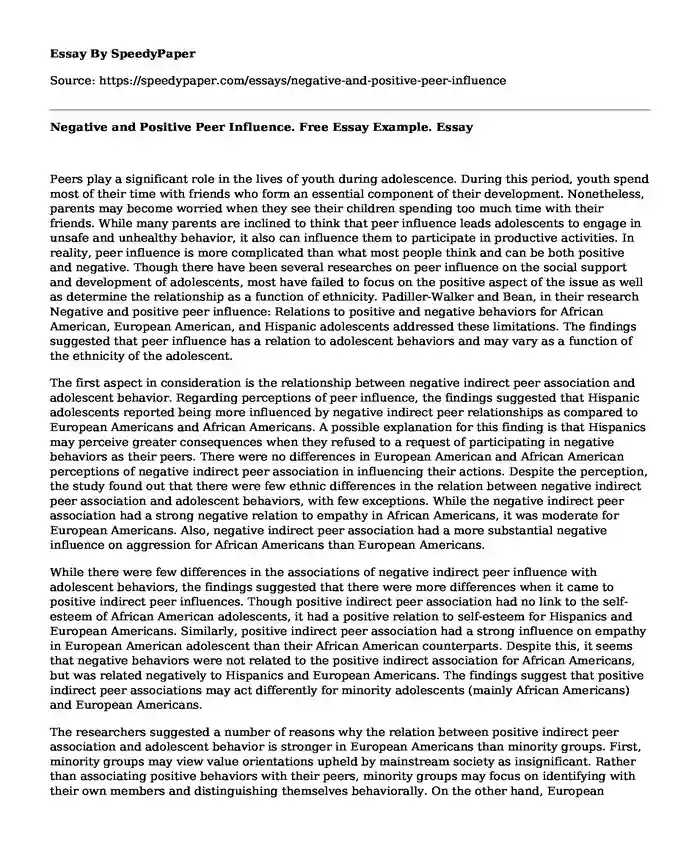
| Type of paper: | Essay |
| Categories: | Communication Social psychology |
| Pages: | 3 |
| Wordcount: | 787 words |
Peers play a significant role in the lives of youth during adolescence. During this period, youth spend most of their time with friends who form an essential component of their development. Nonetheless, parents may become worried when they see their children spending too much time with their friends. While many parents are inclined to think that peer influence leads adolescents to engage in unsafe and unhealthy behavior, it also can influence them to participate in productive activities. In reality, peer influence is more complicated than what most people think and can be both positive and negative. Though there have been several researches on peer influence on the social support and development of adolescents, most have failed to focus on the positive aspect of the issue as well as determine the relationship as a function of ethnicity. Padiller-Walker and Bean, in their research Negative and positive peer influence: Relations to positive and negative behaviors for African American, European American, and Hispanic adolescents addressed these limitations. The findings suggested that peer influence has a relation to adolescent behaviors and may vary as a function of the ethnicity of the adolescent.
The first aspect in consideration is the relationship between negative indirect peer association and adolescent behavior. Regarding perceptions of peer influence, the findings suggested that Hispanic adolescents reported being more influenced by negative indirect peer relationships as compared to European Americans and African Americans. A possible explanation for this finding is that Hispanics may perceive greater consequences when they refused to a request of participating in negative behaviors as their peers. There were no differences in European American and African American perceptions of negative indirect peer association in influencing their actions. Despite the perception, the study found out that there were few ethnic differences in the relation between negative indirect peer association and adolescent behaviors, with few exceptions. While the negative indirect peer association had a strong negative relation to empathy in African Americans, it was moderate for European Americans. Also, negative indirect peer association had a more substantial negative influence on aggression for African Americans than European Americans.
While there were few differences in the associations of negative indirect peer influence with adolescent behaviors, the findings suggested that there were more differences when it came to positive indirect peer influences. Though positive indirect peer association had no link to the self-esteem of African American adolescents, it had a positive relation to self-esteem for Hispanics and European Americans. Similarly, positive indirect peer association had a strong influence on empathy in European American adolescent than their African American counterparts. Despite this, it seems that negative behaviors were not related to the positive indirect association for African Americans, but was related negatively to Hispanics and European Americans. The findings suggest that positive indirect peer associations may act differently for minority adolescents (mainly African Americans) and European Americans.
The researchers suggested a number of reasons why the relation between positive indirect peer association and adolescent behavior is stronger in European Americans than minority groups. First, minority groups may view value orientations upheld by mainstream society as insignificant. Rather than associating positive behaviors with their peers, minority groups may focus on identifying with their own members and distinguishing themselves behaviorally. On the other hand, European American adolescents are more influenced by their peers when it comes to promoting positive behaviors and deflecting negative behaviors. Secondly, the weaker relation may be attributed to other socialization influences such as families, relatives and the church, and the expectations they have of the adolescents in the positive domain. Therefore, the adolescents may place a greater value on interacting with families, relatives or church member rather than their peers.
Peers play an important role in the lives of people during the adolescent stage. While peer influence can offer positive opportunities to adolescents, it also can encourage negative behaviors, all of which can vary, although slightly in some circumstances, depending on the ethnicity of the individual. Padiller-Walker and Beans research on peer influence and ethnicity brought an understanding of the topic in various meaningful ways. First, both positive and negative indirect peer association were strongly related to adolescent behaviors. Second, there were relatively few differences in the association between negative indirect peer influence and adolescent behaviors as a function of ethnicity. However, positive indirect peer influence was more noticeable in European American adolescents than their African American and Hispanic counterparts. These findings are useful to families, communities, schools, churches and other youth groups in assisting adolescents to develop positive peer relationships and repel negative peer influences.
References
Padilla-Walker, L. M., & Bean, R. A. (2009). Negative and positive peer influence: Relations to positive and negative behaviors for African American, European American, and Hispanic adolescents. Journal of Adolescence, 32(2), 323-337.
Cite this page
Negative and Positive Peer Influence. Free Essay Example.. (2019, Nov 18). Retrieved from https://speedypaper.com/essays/negative-and-positive-peer-influence
Request Removal
If you are the original author of this essay and no longer wish to have it published on the SpeedyPaper website, please click below to request its removal:
- Essay Example on HSE in Drilling Operation
- Marketing Essay Example on Product Strategy
- Apparatus and Materials - Free Essay on a Shell Heat Exchanger Calandria
- Paper Sample With 12-Weeks Training Programme for Mother
- Paper Example. The Women Suffrage Movement
- Essay Sample on Psychoanalytical Criticism of Sonny's Blues by James Baldwin
- Essay Example on Rites of Passage: Etic and Emic Perspective
Popular categories




